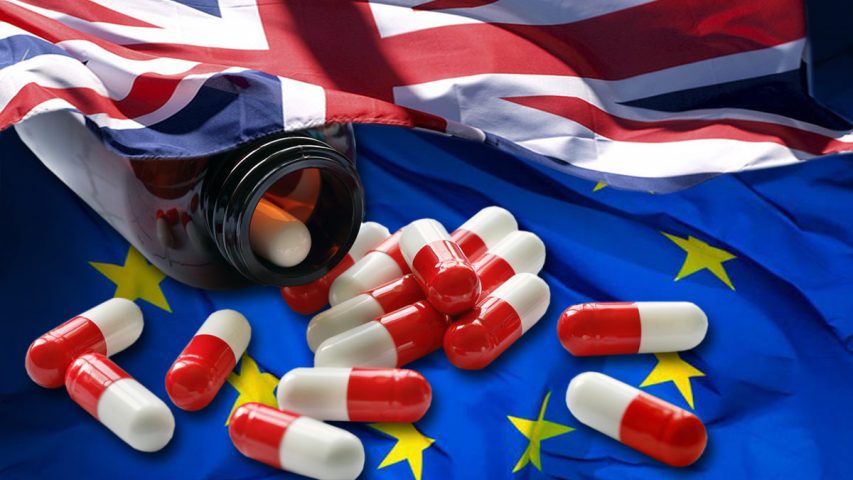- Have any questions? Contact us!
- info@dr-rath-foundation.org

Martin Luther King: Nonviolence Is The Answer To The Crucial Political And Moral Questions Of Our Time
January 18, 2018
Amazon, JPMorgan Chase And Berkshire Hathaway Link Up To Form New Healthcare Firm
February 1, 2018The Brexit Threat To The Pharma Cartel

| “Our Foundation’s vision is for a truly democratic Europe in which science-based natural preventive healthcare approaches make possible the elimination of diseases that kill millions of people every year. This goal clearly cannot be achieved under the Brussels EU. But as committed advocates for natural health therapies, we see Brexit’s disruption of the pharma industry as a valuable opportunity to help turn our vision into a reality.” |
As 2017 drew to a close and the Brexit negotiations prepared to move on to discussing the UK’s future trade relationship with the Brussels EU, Bloomberg News quietly admitted something that our Foundation has long recognized. In an article published on 27 December titled ‘Why Brexit Keeps Drugmakers Up At Night’, three of its reporters described how leaving the Brussels EU has the potential to disrupt almost every aspect of the UK’s pharmaceutical business. For ourselves, as committed advocates of natural health approaches and staunch opponents of the drug industry, this underreported fact represents yet another good reason to support Brexit.
The planned relocation of the so-called European Medicines Agency (EMA) from London to Amsterdam could hit UK pharmaceutical companies particularly hard. The Brussels EU agency responsible for the evaluation and supervision of drugs, the EMA is said to receive around 40,000 visits a year from pharma industry stakeholders. Reflecting on how this might change in the post-Brexit world, in a written message posted online in 2016, Japan’s Ministry of Foreign Affairs stated that if the EMA were to be moved to another Brussels EU country, “the appeal of London as an environment for the development of pharmaceuticals would be lost.”
Threats to the European pharma industry from Brexit

The UK is a key player in the Brussels EU drug industry, constituting 10 percent of its total production and employment. It also manufactures around 40 percent of experimental drugs used in the bloc’s clinical trials, and is its second largest recipient of competitively awarded drug-related funding. Faced with a potential reduction in their lucrative European-derived revenues, British pharma industry executives have much to worry about when they lie awake at night.
But it is not just UK drug makers that will be affected by Brexit. As Jianwei Xu, an associate professor at Beijing Normal University, pointed out last year in a well-researched article published on the London School of Economics website, Brexit will ultimately impact the entire European pharmaceutical industry. Border delays, the disruption of drug research and development, and regulatory divergence: all of these pose threats to the European arm of the ‘business with disease’.
Brussels EU suppression of natural health

So what about the alternatives to pharmaceutical medicine in the Brussels EU? Fact is, the laws governing natural health therapies in Europe are highly restrictive. Stringent regulatory controls exist not only on the types of ingredients that can be put in supplement formulas, but also on the information that can be communicated when promoting them.
From over 44,000 nutrition and health claims submitted to the Brussels EU under its ‘Nutrition and Health Claims Regulation’, which became law in 2006, a mere 261 have been authorized for use. In short, therefore, the Brussels EU is deliberately preventing European citizens from learning about the existence of a century of lifesaving scientific research on vitamins and other micronutrients. The only beneficiaries from this outright suppression of natural health information are the region’s pharmaceutical suppliers – for whom the Brussels EU functions as their ‘politburo’.
Seen from this perspective, with Brexit a clear threat to the interests of drug makers, we believe that natural health advocates everywhere should wholeheartedly support it. Over the years, in its regulation of vitamin therapies, the Brussels EU has consistently adhered to a pro-pharma, anti-science, anti-freedom of choice approach.
Our Foundation’s vision is for a truly democratic Europe in which science-based natural preventive healthcare approaches make possible the elimination of diseases that kill millions of people every year. This goal clearly cannot be achieved under the Brussels EU. But as committed advocates for natural health therapies, we see Brexit’s disruption of the pharma industry as a valuable opportunity to help turn our vision into a reality.



